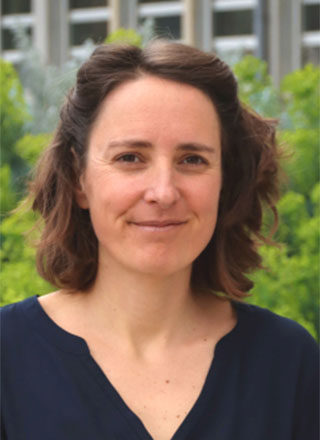- Accueil
- Institut Néel
- Équipes de recherche
- Pôles & Services techniques
- Travailler à l’institut
- Partenariats
- Actualités
- Agenda
- Annuaire

I am a physicist, working at Institut Néel (Grenoble, France), a CNRS laboratory, associated with Grenoble Alpes University UGA . The Institut Néel is devoted to fundamental research in condensed matter physics, enriched by interdisciplinary activities at the interfaces with chemistry, engineering and biology. In this laboratory, I work in the research group Thermodynamics & Biophysics of small systems.
My interest mostly focuses on the electrical activity and organization of excitable cells and in particular neurons! At the interface between nano and neurosciences, these projects are highly intersiciplinary, involving micro and nanofabrication, ultra-hight sensitive instrumentation, signal processing, chemistry, and cellular biology.
ORCID number 0000-0003-4506-2849
Citation (google scholar)
postal adress :
Cécile Delacour
Institut Néel, CNRS UPR2940
25 rue des Martyrs BP 166
38042 Grenoble cedex 9
FRANCE
phone: +33 476 889 094
mail: prenom.nom@neel.cnrs.fr
I work on several topics at the interface between nano and neuro-sciences, at Néel Institut. I moslty focus my researches on the electrical activity and organization of excitable cells like neurons. For that purpose, we are developping neural interfaces with integrated nanodevices arrays (FETs, MEAS etc) to adress neuronal architectures at multiscales. My projects involve several techniques such as electrophysiology, imaging, clean room microfabrication, ultra sensitive instrumentation, signal processing, electrochemistry, and cell culture.
==> Opportunities for master training could be opened on these topics. Contact me!
This work aims to implent versatile tools coming from the nanoelectronics to probe subcellular processes involved in neuronal activity. Nanowire field effect transistors (nanoFEts) are local, non-invasive and active nano-devices. They appear suitable to follow the propagation of spikes along single cell (from synaptic junctions to the axon) and its networks. Such tools should allow a wide range of investigations in neurosciences such as noise enhanced spike propagation or neurons plasticity for instance.
==> Here, we follow single spike propagation at precise location along mature neurons (3 weeks old) with silicon nanowire field effect transistor (Delacour et al 2020 Advanced Engineering Materials).
==> Here, we show the ability to sense ion channel openning and closing with graphene field effect transistors (Veliev et al 2018 2D Mater. 5 045020).
==> Here, we show the ability to sense single spike from individual neurons within in-vitro neuronal networks (Veliev et al 2017 Frontiers in neuroscience 11, 466)
Being highly neuro-compatible, chemically inert, transparent, flexible and still highly conducting, this 2D materials could enhance sensitivity and time stability of the current biosensors, neuronal interfaces and neuroprothesis.
==> Here, we show the positive impact of graphene on neurons growth within in-vitro culture assays (Veliev et al 2016 Biomaterials 86, 33-41)
==> Here, we have shown that graphene reduces the glial scaring process around intracortical implants and enhances both efficiency and life-time of the recording electrodes (Bourrier et al 2019 Advanced healthcare materials 8 (18), 1801331)
==> Here, we show that graphene could be combined with advanced coating made of Hyaluronic Acid that could further improve bio-acceptance and functionality of Brain implants (Bourrier et al 2020 Biomedical Physics and Engineering Express 7 (1), 015006)
we aim to implement thermal probes to track small variations of temperature induced by neuronal activity.
==> Here, we investigate the use of dual-light emitting nanocrystals that exhibits both second harmonic signal and photoluminescence for temperature reading of neuronal network (Dantelle et al 2021 Nanomaterials 11 (2), 479)
Research scientists at Institut Néel (CNRS)- Team Thermodynamics & Biophysics of small systems.
Main topics : nanoelectronics, neural interface, biophysics, exitable cells, neural networks, plasmonics.
Scientific leader of a biotechnology and bioengineering platerfom (BioPhab) at Néel Institut
Member of Laboratory Committees for reducing carbon footprint of research
Member of Liaison Committee (researcher representative for the nat. committee of CNRS)
Member of the organization commitee of weekly Lab seminars (2015 – 2019)
OMNT expert for micro and nanosystems for life science (2017)
Département : MCBT
Équipe : Thermodynamics and Biophysics of small systems (TPS)
Statut : Personnel Chercheur
Organisme : CNRS
Position : Permanent
Email : Cecile.Delacour@neel.cnrs.fr
Téléphone : 04 76 88 90 94
Bureau : E-414
